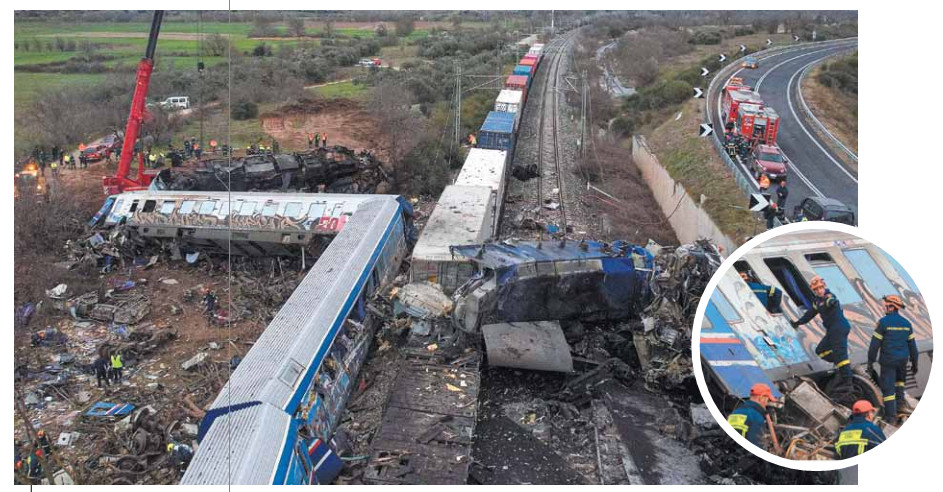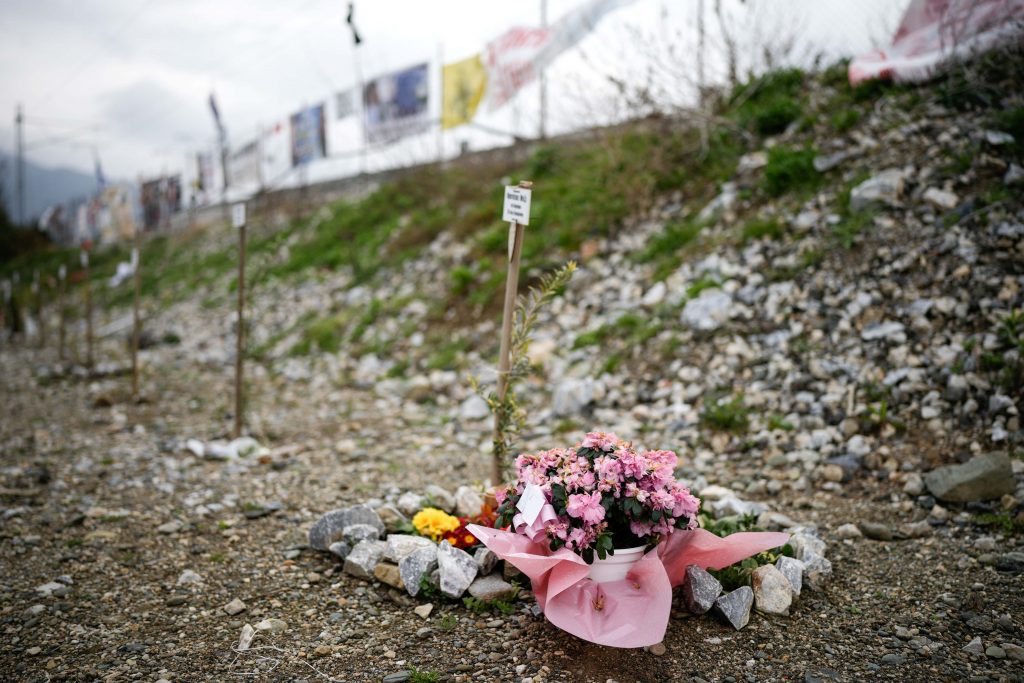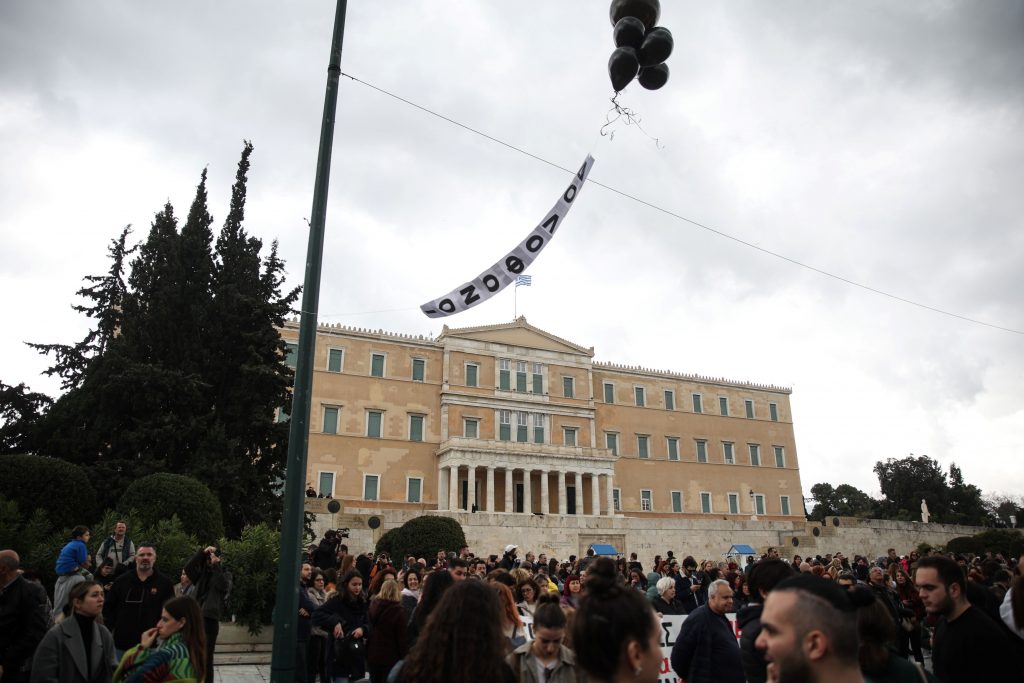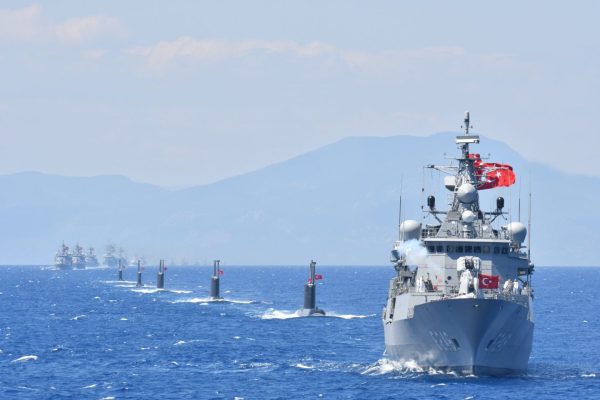
Wednesday’s grim one-year anniversary of the Tempi rail disaster in north-central Greece witnessed an emotional memorial service at the site where two trains inexplicably collided last February, along with a sizable protest in central Athens and other cites as well as customary condolences and politically tinged statements by the country’s political leadership.
Shock and anger are still evident in the east Mediterranean country, as the rail accident claimed 57 lives, a large portion of whom were young college students returning to their studies in the northern city of Thessaloniki.
The primary cause of the crash, according to initial reports, was a catastrophic error by an apparently poorly trained station master to switch a north-bound passenger train into the path of an ongoing south-bound freight train before midnight on Feb. 28, 2023. Another factor was the alleged early departure, from their evening shift, of other more experienced train directors at the main Larissa station. Just as ominously, a complete absence or non-functioning electronic and manual backup safety systems and protocols along numerous segments of the north-south rail network – which would have prevented the unprecedented rail tragedy — have been blamed on successive governments and government-appointed managements of the state-run rail organization.

Α year after the devastating Tempe Valley train crash, which claimed the lives of 57 people, relatives and friends gather at the site of the accident, in Central Greece to pay their respects on February 28, 2024.
Political leaders
In her statement, President of the Republic Katerina Sakellaropoulou said “the pain remains undiminished and questions remain unanswered.”
Sakellaropoulou, a former president of the Council of State (Cos), said it was “the state’s duty to allocate responsibility and to ensure that our country never again experiences such a blow to citizens’ safety and trust”.
On his part, Prime Minister Kyriakos Mitsotakis, whose government has faced vociferous criticism over the rail disaster, noted that “…a year after the Tempi tragedy, the wounds from the loss of the victims remain fresh, with their families still face their own difficult and uphill calvary…the country collided with its worst self; it veered off the rails, buckling under the weight of a hidden reality.”
While expressing his sadness over the painful anniversary, Mitsotakis also attempted to deflect criticism from his political rivals, saying that “…Parliament examined dozens of witnesses with hundreds of pieces of evidence, investigating how human error fatally merged with the age-long shortcomings of the state. But it also does not cease to be a political institution. That is why only the justice system will shed light on the case, as we all want. It is already moving quickly and to the highest degree…I have complete confidence in the justice system and I am sure it will rise to the occasion,” he stated.

People attend a demonstration during a 24hour countrywide strike, demanding justice a year after the devastating Tempe Valley train crash, which claimed the lives of 57 people, in Athens, on February 28, 2024.
Despite winning two back-to-back general elections last May and June, Mitsotakis’ center-right administration has faced a backlash over the train disaster, with the political opposition, media and many of the victims’ relatives charging a “cover-up” to conceal political responsibility.
Meanwhile, main opposition SYRIZA party leader Stefanos Kasselakis posted a message on social media, stressing that “Tempi, one year after. A promise to the memory of the 57 people that lost their lives. They must not and will not be forgotten. We will stand with the members of their families in their struggle for justice.”
PASOK-KINAL party president Nikos Androulakis issued a statement whereby “…a year seems like a long time. A great deal has occurred in a year. For our society, however, the clock stopped on that fateful night of Feb. 28, 2023.”
He also noted that “the causes of the accident, the unacceptable management of the (accident) site and the investigation, everything that followed, confirm that time has stopped in Greece. The ‘why’ and ‘how’ of this tragedy remain unanswered. Those guilty and responsible, for some, remain invisible.”
An ailing rail sector sees passenger, freight traffic decline
Greece’s paltry, by European standards, railway network and organization appears devastated exactly a year after the deadly Tempi train collision and some five months after a catastrophic storm front flooded much of the Thessaly plain in the country’s central mainland.
Restoration of the main north-south rail axis, which despite billions of euros in monies spent in the sector of the past decades is still not a fully dual track, will be completed in late 2025, according to the government and under the most optimistic scenario. The same holds true for the reorganization of the fully state-controlled Hellenic Railways Organisation (OSE), national railway utility that owns, maintains and operates all rolling stock infrastructure in the country outside the greater Athens area.
Railroad experts last September said works to repair the damages from the storm “Daniel” would take two years, the period needed to restore the dual rail line, electrical supply on the same lines and upgraded safety infrastructure – one of the main reasons that led to the tragic Tempi disaster.
According to the latest Eurostat figures released in February, 3.037 million passengers were recorded as using Greece’s rail sector in the third quarter of 2023, down from 4.366 million in the corresponding quarter of 2022.
In terms of freight, 158,000 tons were transported in the third quarter of 2023, down from 169,000 tons in the second quarter of 2023 and 142,000 tons in the first half of 2023, the period in which the Tempi collision occurred.
The downward trend in transported freight on Greece’s rail network is magnified by the fact that 390,000 tons were recorded in the third quarter of 2021, meaning a roughly 50% reduction since that trimester.
At the same time, the rest of Europe is moving in the opposite direction, with Italian rail transports, for instance, recording a near-50% rise in passenger transport since late 2021.
Source: tovima.com
Latest News

Airbnb: Greece’s Short-Term Rentals Dip in March Amid Easter Shift
Data from analytics firm AirDNA shows that average occupancy for short-term rentals dropped to 45% in March, down from 49% the same month last year.

Easter Week in Greece: Holy Friday in Orthodoxy Today
At the Vespers service on Friday evening the image of Christ is removed from the Cross and wrapped in a white cloth

Meloni and Trump Meet in Washington, Vow to Strengthen Western Ties
“I am 100% sure there will be no problems reaching a deal on tariffs with the EU—none whatsoever,” Trump stressed.

ECB Cuts Interest Rates by 25 Basis Points in Expected Move
The ECB’s Governing Council opted to lower the deposit facility rate—the benchmark for signaling monetary policy direction—citing an updated assessment of inflation prospects, the dynamics of underlying inflation, and the strength of monetary policy transmission.

Current Account Deficit Fell by €573.2ml Feb. 2025: BoG
The improvement of Greece’s current account was mainly attributed to a more robust balance of goods and, to a lesser extent, an improved primary income account

Hellenic Food Authority Issues Food Safety Tips for Easter
Food safety tips on how to make sure your lamb has been properly inspected and your eggs stay fresh.

Greek Kiwifruit Exports Smash 200,000-Ton Mark, Setting New Record
According to data by the Association of Greek Fruit, Vegetable and Juice Exporters, Incofruit Hellas, between September 1, 2024, and April 17, 2025, kiwifruit exports increased by 14.2%.

Easter Tourism Boom: Greece Sees 18.3% Surge in Hotel Bookings
Among foreign markets, Israel has emerged as the biggest growth driver, with hotel bookings more than doubling—up 178.5% year-on-year.

Greece to Launch Fast-Track Tender for Offshore Hydrocarbon Exploration
Last week, Papastavrou signed the acceptance of interest for the two Cretan blocks, while similar decisions regarding the two Ionian Sea blocks were signed by his predecessor

American-Hellenic Chamber of Commerce to Open Washington D.C. Branch
AmCham's new office aims aims to deepen U.S.-Greece economic ties and promote investment and innovation between the two countries








![Πλημμύρες: Σημειώθηκαν σε επίπεδα ρεκόρ στην Ευρώπη το 2024 [γράφημα]](https://www.ot.gr/wp-content/uploads/2025/04/FLOOD_HUNGRY-90x90.jpg)




![Airbnb: Πτωτικά κινήθηκε η ζήτηση τον Μάρτιο – Τι δείχνουν τα στοιχεία [γράφημα]](https://www.ot.gr/wp-content/uploads/2024/07/airbnb-gba8e58468_1280-1-90x90.jpg)












![ΙΟΒΕ: Πώς το δημογραφικό υπονομεύει την ανάπτυξη – Τι συμβαίνει στις ελληνικές περιφέρειες [γραφήματα]](https://www.ot.gr/wp-content/uploads/2025/04/dimografiko-600x375.jpg)












![Airbnb: Πτωτικά κινήθηκε η ζήτηση τον Μάρτιο – Τι δείχνουν τα στοιχεία [γράφημα]](https://www.ot.gr/wp-content/uploads/2024/07/airbnb-gba8e58468_1280-1-600x500.jpg)


 Αριθμός Πιστοποίησης
Αριθμός Πιστοποίησης